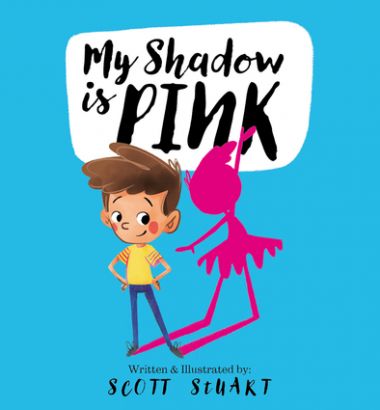'My Shadow is Pink' is about gender identity

Christian parents, Stephen Evans, and his wife Joanne withdrew their four-year-old child from a lesson for World Book Day where the book My Shadow is Pink, by Scott Stuart was going to be used.
You can watch My Shadow is Pink being read aloud online here. Any Christian parent would have concerns about this book being read to their four-year-old child. The book is very clearly promoting transgender ideology. In this book, the idea that you can have an identity that does not match with your body is portrayed through the concept of a 'shadow' which everyone has, and which expresses the person's true identity.
The boy in the book has a 'shadow' which is pink, in contrast with the 'blue shadows' of other male figures in the book, in particular his dad and his brothers. We are told that the boy's 'shadow' loves "things not for boys". In particular, "there's one thing it loves most, I have found it loves wearing dresses, and dancing around."
The boy puts on a dress to go to school, and is upset at not fitting in. After this, his dad appears wearing a dress and says to the boy: "Your shadow is pink, I see now it's true. It's not just a shadow, it's your innermost you."
This sentence promotes the cornerstone foundation of transgender ideology. The idea that people have an 'innermost identity' which is the real them, and which can be completely independent of the body.
His dad later says: "Your shadow is you, and pink it will be. So, stand up with your shadow and yell: 'This is me!'"
He concludes: "So put on that dress and get back to school. If someone wont like you then they are the fool."
The school has argued in a letter to the parents that "the primary focus of the story is not gender identity." It argues that, "The boy in the story doesn't change gender, nor is there any reference to him wanting to."
This is an extraordinary claim given that the boy is encouraged to identify with his 'shadow' and wear a dress to school as if he is a girl.
A spokesperson for the Diocese of Chelmsford has also said that the theme of the school's World Book Day "was stereotypes and not, as has been suggested, gender identity." Certainly gender stereotypes are discussed in the book, and arguably they are promoted with the concepts of blue and pink 'shadows', and things that boys prefer and that girls prefer. We are told that the boy's shadow loves "things not for boys" which only serves to reinforce gender stereotypes.
While the school and the diocese may attempt to deny that the book is about gender identity, the publisher unashamedly states that this is what it is about. The description of the book on Amazon states unequivocally that the story "touches on the subjects of gender identity, equality and diversity." It is clearly the intention of the author that this book promotes the concept of people having a gender identity in a way that is accessible for very young children.
Indeed, the author put a video on TikTok in which he explains that his son wanted to dress as Elsa to go to the cinema, and Stuart told him "There is no way you're doing that ... alone." The video then shows a young boy wearing a dress, accompanied by his father also wearing a dress. This video has had over 22 million views at the time of writing.
The respected campaign group Transgender Trend lists My Shadow is Pink as "Among the books which promote the idea that changing appearance through opposite sex clothes and hair length changes natal sex."
An online review of the book concludes: "This is the perfect way to end a book about gender identity in a world where trans rights are clearly still very much needing to be fought for." Another describes it as: "A heart-warming book about parenting a gender diverse child."
Do the school and the diocese really believe that this book is not about gender identity? Have they read the publisher's description of the book? Have they seen how it is reviewed and received? Do they know that the author himself encouraged his son to wear a dress and joined him in doing so?
I am pleased, in a way, that the school and the diocese go to some lengths to deny that this book is about gender identity. This shows that they know that it is wrong to promote transgender ideology to very young children. Their denials do not stand up to the minimum of scrutiny. What remains now is for them to apologise and promise to ensure that impressionable young children are not taught material promoting transgender ideology.
Tim Dieppe is co-author with Beth Peltola of Questions to Ask Your Muslim Friends, published by Wilberforce Publications, 2022.











